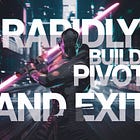The 10 Specific Actionable Decisions I Made in My Life That Lead Me To Becoming a Multi-Millionaire
The 8-Figure Entrepreneur's Playbook: Decisions That Accelerated My Wealth Accumulation
The path to becoming a multi-millionaire isn’t paved with luck or guarded by gatekeepers.
It’s forged through specific, actionable decisions—choices you can start making today.
At 38, I’ve managed over $6 billion in assets at KCG Holdings, one of Wall Street’s top high-frequency trading firms.
I hold a PhD in Applied Mathematics from MIT and have spent 15 years mastering computer science and event forecasting using Python.
I built a financial Substack from scratch to 700,000 subscribers in just eight months, and it now generates over $100,000 monthly.
I’m sharing the strategies that propelled me to financial freedom. Money is a tool for freedom—not an end goal. True happiness comes from purposeful living, balance, and mindfulness.
In this post, I discuss 10 specific, actionable decisions that led me to become a multi-millionaire.
Over time, I will make a separate premium post covering all of these in detail.
Don’t forget the lifetime plan is still available:
1. Renting Instead of Buying Real Estate
What I did: I chose to rent my homes rather than purchase them. This wasn’t due to a lack of funds or commitment issues. Renting provided me with liquidity and flexibility. It allowed me to relocate swiftly for career opportunities and invest capital that would otherwise be tied up in property into the stock market and other ventures with higher returns.
Why it matters: Homeownership is often romanticized, but it’s not always the best financial move. Homeownership ties up capital, incurs maintenance costs, and reduces flexibility. Renting can free up resources and keep you agile in a fast-paced market.
The details:
2. Automating Investments into VTSAX in My Early 20s
What I did: I set up automatic transfers from my salary to invest in the Vanguard Total Stock Market Index Fund (VTSAX) as soon as I started earning. This meant a portion of my income was invested every month before I saw it.
Why it matters: Automation removes the emotional component of investing. By consistently investing in a low-cost, broad-market index fund, I capitalized on the power of compounding over time without trying to time the market.
The details:
3. Avoiding Speculative Fads Like Crypto and AI Hype
What I did: I deliberately avoided speculative investments like cryptocurrency and hyped AI startups. Instead, I focused on assets with solid fundamentals and long-term growth potential.
Why it matters: Chasing the latest investment fads can be tempting, but they often lead to volatility and losses. Building wealth requires discipline and a focus on time-tested investment strategies. The single best financial decision of my life was not getting into crypto and instead putting that time into becoming an expert in programming and marketing.
The details: Stop being greedy. Lose survivorship bias.
The opposite of crypto are online businesses that I’m building:
4. Learning Python to Automate and Scale My Life
What I did: I invested time in learning Python programming. This skill enabled me to automate trading strategies, analyze vast datasets, and optimize daily tasks.
Why it matters: In the digital age, programming skills are invaluable. Python, in particular, is versatile and accessible. It empowers you to work smarter, not harder and can give you a significant edge in trading and investing.
The details: Start here for free. It's completely free, and I’m not affiliated with this.
EDIT: Once you know Python, you can use things like these:
Just skim through them…
5. Studying Applied Mathematics
What I did: Pursuing a PhD in Applied Mathematics wasn’t just about academic achievement. It honed my analytical skills and provided a deep understanding of complex financial models and algorithms.
Why it matters: A strong foundation in mathematics enhances problem-solving abilities and critical thinking. It allows for better modeling of market behaviors and risk assessment in finance.
The details: You don’t need a PhD to develop deep critical thinking skills. When I was young, we didn’t have the tools we have now. I recommend starting here. It's completely free, and I’m not affiliated with this.
6. Having Kids
What I did: I became a father of four—9, 5, and 2-year-old twins. Instead of viewing kids as a financial and time burden, I saw them as motivation. They pushed me into "hardcore flow mode," driving me to work smarter and more efficiently and secure a prosperous future for my family.
Why it matters: Children can inspire a long-term perspective on wealth building. They add purpose to your financial goals and can fuel your drive to succeed.
The details: This is a very personal choice. Not everyone wants kids or will benefit from having them. You have to answer this yourself.
7. Mastering Swing Trading
What I did: I developed and refined swing trading strategies to capitalize on short to medium-term market movements. This approach supplemented my long-term investments and generated additional income.
Why it matters: Swing trading can significantly boost returns when executed with discipline and analysis. It requires understanding market trends, technical analysis, and risk management.
The details: This is why I’m building the new TradingView Indicator for you and will soon start a new series covering Technical Analysis patterns that few talk about.
8. Embracing Christianity and Applying Jesus's Teachings
What I did: I embraced Christianity by focusing directly on Jesus' teachings as presented in the Bible rather than through institutional religion. I made a conscious effort to internalize His principles—such as love, compassion, humility, and integrity—and apply them in my daily life and business practices.
Why it matters: Following Jesus's teachings gave me a strong moral compass and a sense of purpose beyond financial success. It guided me to make ethical decisions, treat others respectfully, and seek fulfillment through service and meaningful contributions, not just wealth accumulation.
The details: By aligning my actions with these teachings, I cultivated deeper relationships and a balanced lifestyle. This spiritual foundation kept me grounded during challenging times and reminded me that true wealth includes personal growth and positively impacting others.
9. Focusing on Earning More, Not Just Saving
What I did: Instead of obsessing over cutting expenses, I concentrated on increasing my income. I invested in assets that generated returns, developed profitable trading strategies, and built a high-earning Substack.
Why it matters: There’s a limit to how much you can save, but not how much you can earn. Focusing on income generation accelerates wealth accumulation far more effectively than frugality alone.
The details:
10. Marrying the Right Person and Having a Prenup
What I did: I married someone who shares my values and financial goals. We openly discussed finances and established a prenuptial agreement to protect our interests.
Why it matters: A supportive partner can significantly impact your financial journey. Clear communication and legal agreements provide stability and prevent personal issues from derailing your financial plans.
The details:
These decisions weren’t made lightly or without challenges.
Each required foresight and discipline and sometimes went against conventional wisdom.
But together, they created a synergy that propelled me to financial independence.
God Bless,
Jack Roshi, PhD













Thank you for this insightful posts along with links to past and informing us about the future posts. I am really interested in various ways to reducing taxes while also learning Python (I will try the link for sure) and also on growing multiple streams of income and Substack.
🙏
Appreciate your insightful perspectives on accumulating wealth. I would be thrilled if you could delve deeper into the next steps—specifically, how to maintain and protect that wealth. It would be incredibly beneficial to hear more about legally minimizing taxes through the avenues you mentioned.